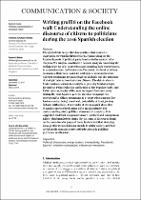Por favor, use este identificador para citar o enlazar este ítem:
https://repositorio.usj.es/handle/123456789/356
| Título : | Writing graffiti on the Facebook wall: Understanding the online discourse of citizens to politicians during the 2016 Spanish election |
| Autor: | Zurutuza-Muñoz, Cristina



Lilleker, Darren G. 

|
| Palabras clave : | Political discourse; E-expression; Interactivity; Facebook; Spanish election campaigns; Citizen conversation |
| Fecha de publicación: | 2018 |
| Editorial : | UNIV NAVARRA, SERV PUBLICACIONES, CAMPUS UNIV, PAMPLONA, 31009, SPAIN |
| Citación : | Zurutuza-Muñoz, C. & Lilleker, D. (2018). Writing graffiti on the Facebook wall: Understanding the online discourse of citizens to politicians during the 2016 Spanish election. Communication & Society31(3), 27-42. |
| Resumen : | The goal of this research is to examine what form of e-expression we can find from citizens commenting on the Facebook posts of political party leaders in the context of an election. We employ quantitative content analysis, involving the coding of styles of e-expression and counting their occurrences, to determine how politician's use Facebook, the level of citizen comments, their tone, content, and style of communication, whether comments are monologic or dialogic and the structure of dialogic interactions between citizens. The data is drawn from comments made to a sample of posts by Mariano Rajoy, incumbent Prime Minister and leader of the Popular Party, and Pablo Iglesias, leader of the new insurgent Podemos party during the 2016 Spanish general election campaign. We conceptualise citizen comments as e-expression a means for having a voice, being heard and, potentially at least, joining debates with others. The results of this research show that dynamics on Facebook pages offer an opportunity for understanding wider political dynamics in a society. It is suggested that both exogenous macro-political and endogenous micro-platform factors shape the patterns of discourse found on the social media pages of these leaders and that studying these platforms call indicate trends in wider society and how social media can accentuate attitudes towards political platforms and leaders. |
| URI : | https://repositorio.usj.es/handle/123456789/356 |
| ISSN : | 0214-0039 |
| Aparece en las colecciones: | Artículos de revistas |
Ficheros en este ítem:
| Fichero | Descripción | Tamaño | Formato | |
|---|---|---|---|---|
| 35688-Article Text-99863-1-10-20190215.pdf | 6,18 MB | Adobe PDF |  Visualizar/Abrir |
Este ítem está sujeto a una licencia Creative Commons Licencia Creative Commons

